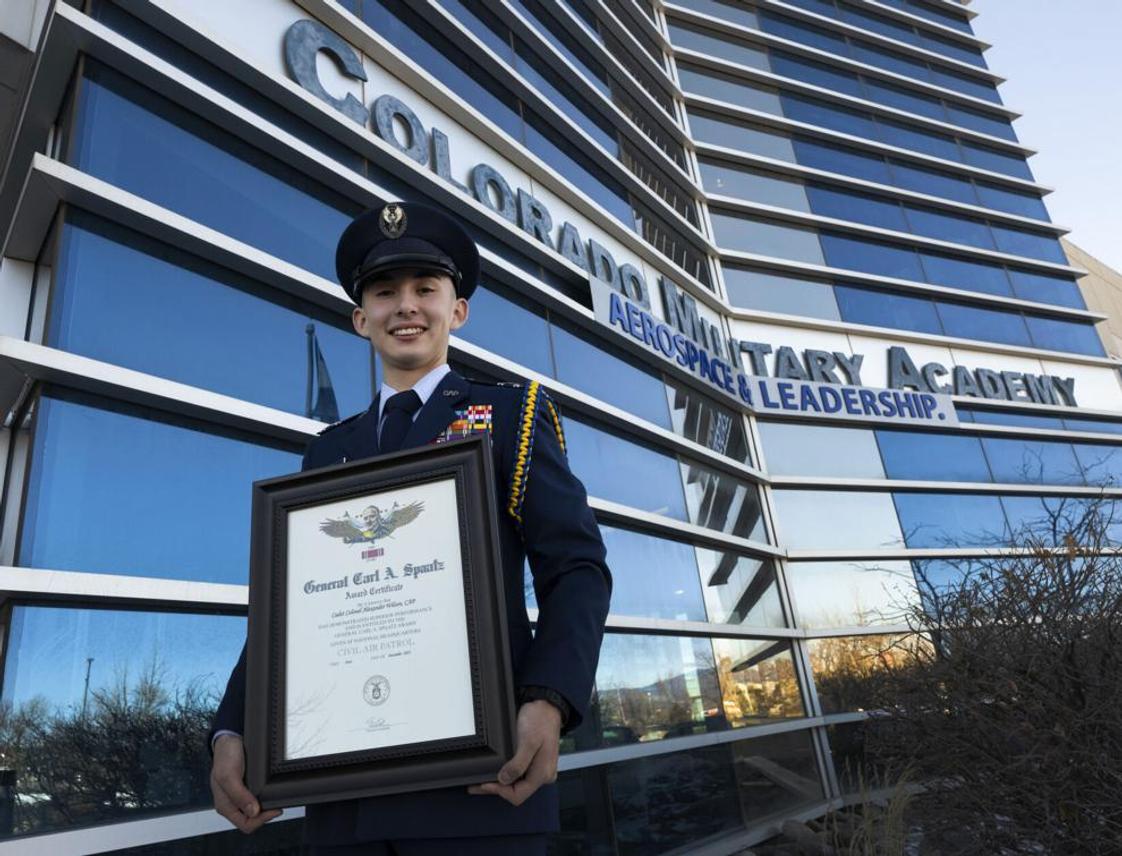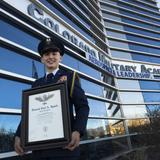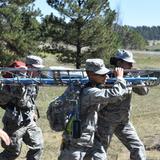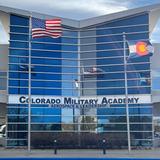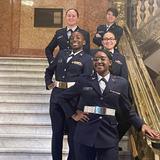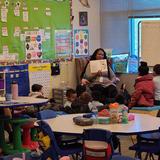Serving 615 students in grades Prekindergarten-12, Colorado Military Academy ranks in the bottom 50% of all schools in Colorado for overall test scores (math proficiency is bottom 50%, and reading proficiency is bottom 50%).
The percentage of students achieving proficiency in math is 19% (which is lower than the Colorado state average of 33%). The percentage of students achieving proficiency in reading/language arts is 21% (which is lower than the Colorado state average of 45%).
The student-teacher ratio of 19:1 is higher than the Colorado state level of 15:1.
Minority enrollment is 58% of the student body (majority Hispanic), which is higher than the Colorado state average of 50% (majority Hispanic).
Quick Facts (2025-26)
- School Type: Charter School
- Grades: Prekindergarten-12
- Enrollment: 615 students
- Student-Teacher Ratio: 19:1
- Minority Enrollment: 58%
- Graduation Rate: ≥80% (Top 50% in CO)
- Overall Testing Rank: Bottom 50%
- Math Proficiency: 19% (Btm 50%)
- Reading Proficiency: 21% (Btm 50%)
- Science Proficiency: 11-19% (Btm 50%)
- Source: National Center for Education Statistics (NCES), CO Dept. of Education
Top Rankings
Colorado Military Academy ranks among the top 20% of public schools in Colorado for:
Category
Attribute
Diversity
School Overview
Colorado Military Academy's student population of 615 students has grown by 6% over five school years.
The teacher population of 33 teachers has declined by 13% over five school years.
School Type
Grades Offered
Grades Prekindergarten-12
(No virtual instruction)
(No virtual instruction)
Total Students
615 students
Gender %
Total Classroom Teachers
33 teachers
School Calendar
School Rankings
Colorado Military Academy ranks within the bottom 50% of all 1,748 schools in Colorado (based off of combined math and reading proficiency testing data).
The diversity score of Colorado Military Academy is 0.69, which is more than the diversity score at state average of 0.62. The school's diversity has stayed relatively flat over five school years.
Overall Testing Rank
#1431 out of 1748 schools
(Bottom 50%)
(Bottom 50%)
Math Test Scores (% Proficient)
19%
33%
Reading/Language Arts Test Scores (% Proficient)
21%
45%
Science Test Scores (% Proficient)
(20-21)11-19%
29%
Student-Teacher Ratio
19:1
15:1
American Indian
1%
1%
Asian
4%
3%
Hispanic
36%
36%
Black
11%
5%
White
42%
50%
Hawaiian
3%
n/a
Two or more races
3%
5%
All Ethnic Groups
Graduation Rate
≥80%
82%
Eligible for Free Lunch
45%
39%
Eligible for Reduced Lunch
6%
6%
School Statewide Testing
School District Name
Sports
Total Sports Offered
5 sports
Sports
BasketballCross Country
Cross Country RunningSoccer
Volley Ball
Extracurriculars
Total ExtracurricularsTotal Extra-curric.
17 extracurriculars
ExtracurricularsExtra-curric.
Club or Organization:
Arts and Music Programs:
Recreational Athletic Programs:
Art ClubBook Club
Chess ClubCivil Air Patrol
Craft ClubDrama Club
eSports ClubPokemon Club
Science Club
Arts and Music Programs:
BandChoir
Drumline
Recreational Athletic Programs:
Coed BasketballCoed Volleyball
Field HockeyRunning Club
Soccer
Source: National Center for Education Statistics (NCES), CO Dept. of Education
School Notes
- Colorado Military Academy is a tuition free public charter school for K-12 conveniently located next to Peterson SFB. Pre-K is available as a tuition-based program.
- CMA offers a structured learning environment inspiring academic excellence, self-discipline, responsibility, and community involvement with the support of peers, instructors, and mentors. CMA is invested in developing leadership skills in all of our Cadets. Our young leaders are inspired on a daily basis through student-led mentorship programs and integrated leadership opportunities. Continued leadership growth and our strong academic program provides a pathway for college-bound students while the Civil Air Patrol program provides experience, character development, and bonds that will last a lifetime. The practical leadership experience earned at CMA will be beneficial regardless of the path they choose in life.
- As a member of the Association of Military Colleges & Schools of the United States (AMCSUS), Colorado Military Academy is proud to be a one of 33 military schools dedicated to developing character driven leaders who will lead us to a brighter tomorrow. CMA students benefit from our membership through increased opportunities for acceptance into higher educational institutions to include but not limited to Virginia Military Institute, New Mexico Military Institute, Virginia Tech, Texas A&M, and Georgia Military College, The Citadel and University of North Georgia as well as guaranteed acceptance at Norwich University and The Citadel if they so choose. The pathways that AMCSUS has created for our students are invaluable to their success regardless of the path they choose after graduation.
- We are not a reform school nor boarding school specializing in children requiring behavior intervention. We expect appropriate behaviors and demeanor of our cadets when they begin school. Our school inspires leadership, responsibility, discipline, and community involvement to all cadets that enroll at CMA.
Profile last updated: 02/09/2025
Frequently Asked Questions
What is Colorado Military Academy's ranking?
Colorado Military Academy is ranked #1431 out of 1,748 schools, which ranks it among the bottom 50% of public schools in Colorado.
What schools are Colorado Military Academy often compared to?
Colorado Military Academyis often viewed alongside schools like Woodmen Hills Elementary School, Falcon Elementary School Of Technology, Grand Mountain School by visitors of our site.
What percent of students have achieved state testing proficiency in math and reading?
19% of students have achieved math proficiency (compared to the 33% CO state average), while 21% of students have achieved reading proficiency (compared to the 45% CO state average).
What is the graduation rate of Colorado Military Academy?
The graduation rate of Colorado Military Academy is 80%, which is lower than the Colorado state average of 82%.
How many students attend Colorado Military Academy?
615 students attend Colorado Military Academy.
What is the racial composition of the student body?
42% of Colorado Military Academy students are White, 36% of students are Hispanic, 11% of students are Black, 4% of students are Asian, 3% of students are Hawaiian, 3% of students are Two or more races, and 1% of students are American Indian.
What is the student-teacher ratio of Colorado Military Academy?
Colorado Military Academy has a student ration of 19:1, which is higher than the Colorado state average of 15:1.
What grades does Colorado Military Academy offer ?
Colorado Military Academy offers enrollment in grades Prekindergarten-12 (No virtual instruction).
What school district is Colorado Military Academy part of?
Colorado Military Academy is part of State Charter School Institute School District.
School Reviews
Review Colorado Military Academy. Reviews should be a few sentences in length. Please include any comments on:
- Quality of academic programs, teachers, and facilities
- Availability of music, art, sports and other extracurricular activities
Recent Articles

How Public Schools Support Students on Free / Reduced-Lunch Programs
Explore how U.S. public schools support students eligible for free or reduced-price lunch through nutrition, academic, and wraparound services in 2025.

Hidden Costs of Public Schools: Fees, Supplies & Extras
Explore the hidden costs in public schools鈥攆ees, supplies, extracurriculars鈥攁nd how parents can plan for them in 2025.

Public School Funding 2025: What Families Should Know
Essential insights on public school funding in 2025鈥攈ow it works, what鈥檚 changing, and what families should know to stay ahead.


